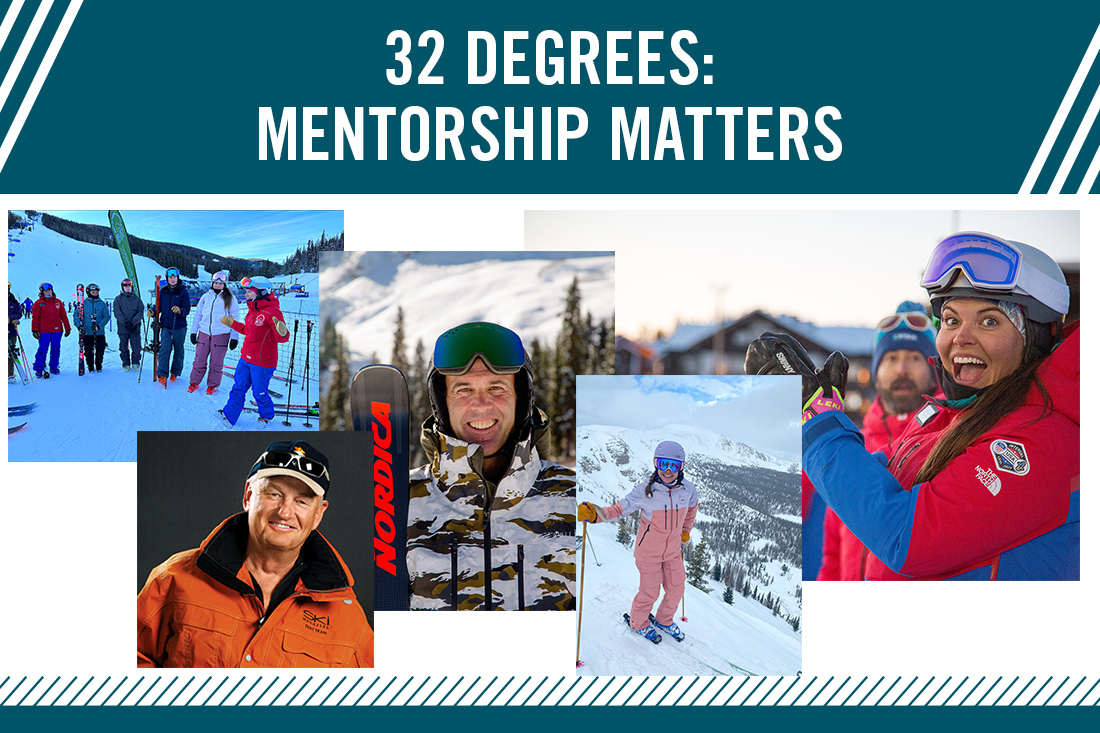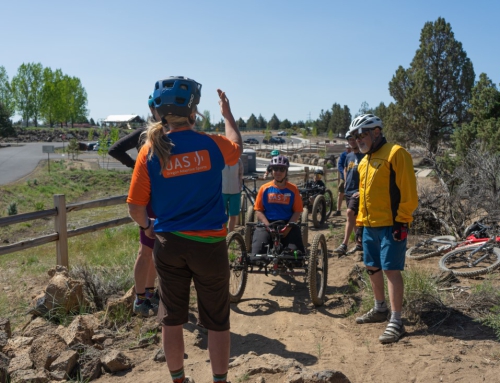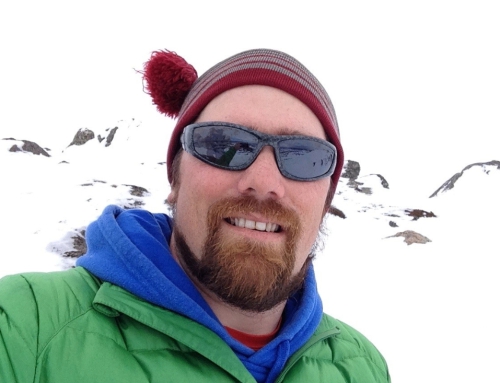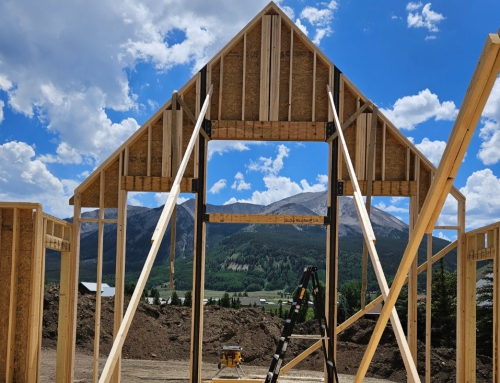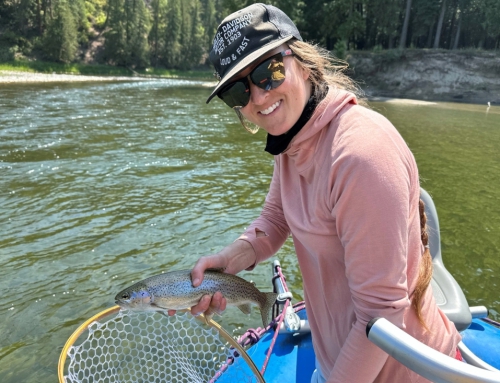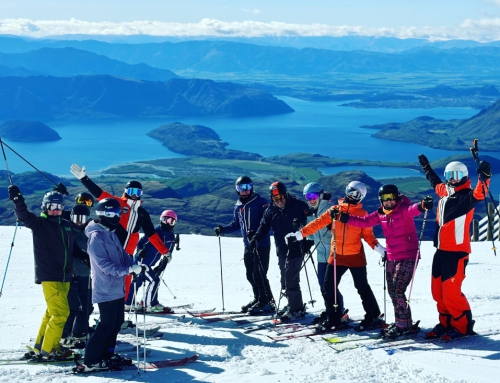32 Degrees: Mentorship Matters
This feature by Krista Crabtree appeared in the Winter 2024 Issue of 32 Degrees. You can read the entire issue – including more details about mentoring – by visiting the 32 Degrees page on our website.
You’re likely familiar with the word mentor – whether you are one, benefitted from having one, or are in search of one. Mentor is a bit of a buzzword these days, but did you know its origins date back thousands of years? It first appeared as a character in Homer’s The Odyssey as the one entrusted to watch Odysseus’ young son, Telemachus, as Odysseus sets out on a long journey. Athena, the Greek goddess of wisdom, disguised herself as Mentor and served as counselor to Telemachus in Odysseus’ stead.
The word mentor has come to mean someone with experience who advises another person with less experience. It is uniquely important for ski and snowboard instructors as a way to connect with others in the snowsports industry who can help with skill development, career advice, and assessment prep.
Nearly every seasoned ski or snowboard instructor can recall receiving help from a more experienced instructor who guided them on their journey. Many instructors helped me, but there are two early mentors that 32 Degrees readers will recognize. As a former East Coast ski racer and new editor at SKI magazine, I was tasked with helping produce and edit instruction features with Stu Campbell and Michael Rogan. A gifted skier, instructor, and writer, Stu was a former PSIA-AASI board member (1984-90) and 2002 recipient of the prestigious Educational Excellence Award. Michael is a seven-term member of the PSIA Alpine Team (1996-present) and currently its coach. They were my bridge from the world of ski racing to ski instruction, and I learned to observe, ask questions, and listen intently to their answers – something I still do when I have the opportunity to ski with Michael. (Sadly, Stu passed away in 2008.)
What I didn’t realize was that I had mentored someone without knowing it. In the late 1990s, I coached a young girl from Boulder, Colorado, named Zoe Mavis. Over the past 24 years, Zoe grew from a junior ski racer to instructor to examiner to PSIA-AASI National Team member.
She has accomplished much since the days I knew her as a teenager, so I asked her to take a deep dive into the topic of mentorship in our sports. Zoe helped me discover how impactful the relationship between mentor and mentee can be. A mentor/mentee relationship could last for years, but sometimes it’s as simple as showing interest in someone, taking a run together, or offering words of encouragement. Here’s a closer look at how mentorship has helped instructors like Zoe and other PSIA-AASI National Team members on their journeys as snow pros.
Q: Who do you regard as your mentor, and what was the impact of that mentorship on you professionally and personally?
A: I remember being in your group as a junior racer. It was impactful at that time of my life to have a young, fun, energetic coach – the first female coach I had. The impact of that was having someone to relate to, even on the basic standard of gender because the racing world was pretty male-dominated. I remember thinking, “I could do something like this” when I get older. I have had many great male mentors who were impactful to my development, but nothing can take the place of directly relating to someone in a leadership role.
Q: That’s quite an honor to hear. I had a similar experience of growing up ski racing in a male-dominated space and I too have vivid memories of my first female coach, Alison Gannett, who was young and fun. How did you navigate your later teenage years as a ski racer, and when did you transition from racing to instruction?
A: Near the end of racing, I felt like I wasn’t performing well enough for anyone to give me the time of day, so why would I put the effort into doing better? In college, I joined PSIA and at my Level I exam at Bridger Bowl, my examiner, Dave Casto, said, “I’m sure your race coaches loved you because you have awesome skills.” The truth is, I didn’t feel supported by them. But over my trajectory in PSIA, Dave valued my accuracy in skills. Whenever I trained with him, it would be on finer movement patterns and doing things accurately at the snow level. With the amount of skiing I had from ski racing, I was coachable and had body awareness. He and I still ski together and it’s fun to have that connection. The people who had the biggest impact believed in my potential.
Q: What drove you to keep moving up the ladder?
A: I’m a very results-driven human. In PSIA, there are goal-oriented pathways like certification, which is a good way to train toward achieving a goal. The biggest thing that helped me was having trainers who were invested and cared. But another big piece was having peer support. We discount how much help having a training buddy can be, because they can provide mentorship from an adjacent position. You can’t do it alone – you have to have help in many different forms.
Q: Now that you’re in a leadership role, how do view mentorship?
A: As training manager for the Big Sky Mountain Sports School (my dream job!), I feel fortunate to work at a place that completely values staff development. Christine Baker, the director of the Big Sky Mountain Sports School, gives me autonomy to do what I need to do to connect with staff. She’s been a driving force in the region to help females move into leadership roles.
Q: What is your advice for instructors who are looking for a mentor?
A: Finding a mentor can be a little difficult, and sometimes it takes stepping outside your comfort zone to have a conversation with someone you look up to. It’s important to have ownership over what you’re trying to do and have clear goals. You can look for help and development, but the motivation has to come from within. No one will invest in you if you aren’t ready to invest in yourself.
If you are in the position to mentor someone else, know for sure that they are motivated. You might not be the right voice for every person, but connecting people to the right mentor is a big part, too. Everyone in a leadership position should look around and state out loud the potential they see. Even a little encouragement can be powerful in helping someone realize their own potential.
It’s a testament to the power of mentorship that it endures today after being recorded in ancient text. For me, the surprise of learning years later that I had a positive impact on Zoe was touching and affirming. It allowed me to reflect on those who mentored me along my journey in the snowsports industry as well as renewing purpose within me to help others on theirs. In this way, mentorship is the gift that keeps on giving – whether you’re on the receiving end or the giving end. Even a small gesture can leave a large impression with things like passing an exam, mastering a skill, gaining confidence, or knowing that someone in the industry who has made a few more turns than you believes you’re capable of reaching your goals.
Krista Crabtree directs the Eldora Women’s Program and coaches women’s camps at Vail and Silverton. Her credentials include PSIA Alpine Level II and Children’s Specialist 2. She is also a U.S. Ski & Snowboard coach, working with U14 athletes, and head coach for the Boulder Valley High School ski team. When not on the hill, she writes for publications like 32 Degrees and has authored two children’s books.

